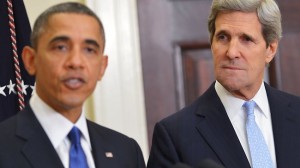 WASHINGTON — Only two weeks after Washington and the nation were debating a unilateral military strike on Syria that was also intended as a forceful warning to Iran about its nuclear program, President Obama finds himself at the opening stages of two unexpected diplomatic initiatives with America’s biggest adversaries in the Middle East, each fraught with opportunity and danger.
WASHINGTON — Only two weeks after Washington and the nation were debating a unilateral military strike on Syria that was also intended as a forceful warning to Iran about its nuclear program, President Obama finds himself at the opening stages of two unexpected diplomatic initiatives with America’s biggest adversaries in the Middle East, each fraught with opportunity and danger.
Without much warning, diplomacy is suddenly alive again after a decade of debilitating war in the region. After years of increasing tension with Iran, there is talk of finding a way for it to maintain a face-saving capacity to produce a very limited amount of nuclear fuel while allaying fears in the United States and Israel that it could race for a bomb.
Syria, given little room for maneuver, suddenly faces imminent deadlines to account for and surrender its chemical weapons stockpiles — or risk losing the support of its last ally, Russia.
For Mr. Obama, it is a shift of fortunes that one senior American diplomat described this week as “head spinning.”
In their more honest moments, White House officials concede they got here the messiest way possible — with a mix of luck in the case of Syria, years of sanctions on Iran and then some unpredicted chess moves executed by three players Mr. Obama deeply distrusts: President Bashar al-Assad of Syria, President Vladimir V. Putin of Russia, and Iran’s erratic mullahs. But, the officials say, these are the long-delayed fruits of the administration’s selective use of coercion in a part of the world where that is understood.
“The common thread is that you don’t achieve diplomatic progress in the Middle East without significant pressure,” Benjamin J. Rhodes, a deputy national security adviser, said Thursday. “In Syria, it was the serious threat of a military strike; in Iran it was a sanctions regime built up over five years.”
Skeptics — and there are plenty in the National Security Council, the Pentagon, America’s intelligence agencies and Congress — are not so optimistic. They think Mr. Obama runs the risk of being dragged into long negotiations and constant games of hide-and-seek that, ultimately, will result in little change in the status quo. They argue that the president’s hesitance to pull the trigger on Tomahawk strikes on Syria nearly two weeks ago, and the public and Congressional rebellion at the idea of even limited military strikes, were unmistakable signals to the Syrian and Iranian elites that if diplomacy fails, the chances of military action ordered by the American president are slight.
“These two situations are deeply intertwined,” said Dennis B. Ross, who served as Mr. Obama’s lead adviser on Iran for the first three years of his presidency, and who argued for attacking Syria after the Aug. 21 gas attacks that killed more than a thousand civilians. “If the Syrians are forced to give up their weapons, it will make a difference to the Iranian calculation,” and would raise the prospects of some deal with Tehran.
“If the Syrians can drag this out and give up just a little, that will send a very different message to the supreme leader,” he said.
Hovering over it all is a third negotiation: Secretary of State John Kerry’s effort to jump-start talks between Israel and the Palestinians, a political minefield that Mr. Obama and Mr. Kerry’s predecessor, Hillary Rodham Clinton, for the most part avoided.
All these possibilities could evaporate quickly; just ask the State Department diplomats who in the last years of the Bush administration thought they were on the way to keeping North Korea from adding to its nuclear arsenal, or the Clinton administration officials who thought they were on the verge of a Middle East peace deal.
Mr. Obama will most likely know whether the Syrian accord stands a chance of success long before he knows whether the sudden Iranian charm offensive is real or a mirage. The Syrians now face a series of deadlines. The first comes this weekend, when they must issue a declaration of their chemical stocks that “passes the laugh test,” as Gary Samore, Mr. Obama’s former top adviser on unconventional weapons, put it earlier in the week.
The State Department has hinted that the Saturday deadline is not hard and fast. And while Mr. Assad will presumably admit to quantities roughly in line with the amounts that the United States and Russia have estimated are in his hands, the harder question for the Syrian leader is whether to lead inspectors to every depot, every warehouse, every research and development facility. That is supposed to happen in November, with total disarmament by the middle of next year.
By The New York Times
The Iran Project is not responsible for the content of quoted articles.

 QR code
QR code